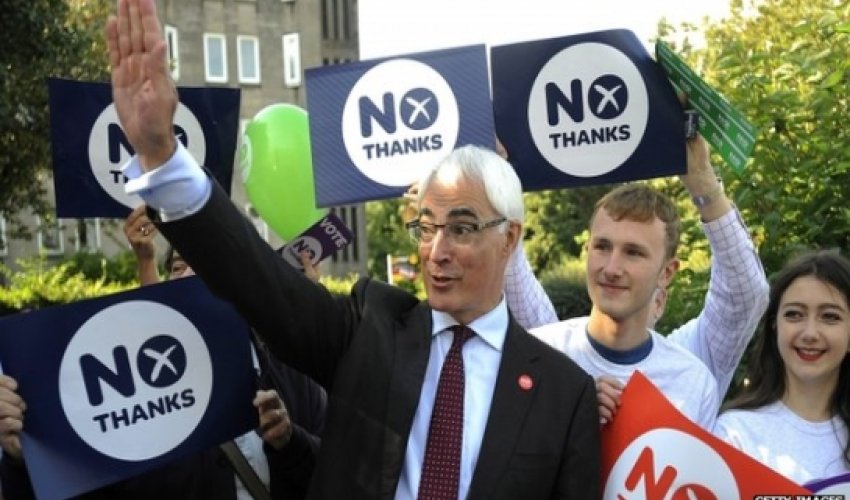Scottish Independence: What happens after the decision?

If Scotland votes No to independence, a huge sigh of relief would echo through the corridors of Westminster. David Cameron would not go down as the prime minister who lost the United Kingdom. He would not be forced out of office.
Ed Miliband would not go down as the Labour leader who lost Scotland to the nationalists. And Nick Clegg would not find himself working with a new prime minister.
But the political consequences of a No vote would be huge. This is because Westminster has vowed to say yes to more devolution. The leaders of the three largest UK parties have promised that the Scots would get more powers over their taxes, welfare and spending.
They hope to agree the details by November and publish draft legislation in January. But it would not be easy, not least because the parties disagree over detail.
Take taxation. The Conservatives say Holyrood should be able to set income tax rates and bands, with just the tax-free personal allowance decided by Westminster.
Who votes on what?
Labour says Scotland should be able to vary income tax only by 15 pence in the pound.
The Lib Dems believe the Scottish government should be able to fix not only income tax but also capital gains, inheritance and a whole range of other taxes. Somehow these differences would need to be hammered out - and soon.
But as well as securing agreement among themselves, Mr Cameron, Mr Miliband and Mr Clegg would have to win support for their plans from within their parties.
Many MPs are worried about what they see as rushed constitutional reform. Others are worried about the lack of consultation. And many Conservatives are asking why they should follow an agenda they believe is being set by former Labour Prime Minister Gordon Brown.
And there would be principled opposition by some MPs who think any more power for Scotland should come only with wider constitutional reform for the whole of the UK.
Many Conservatives believe extra devolution to Scotland should be matched by giving English MPs a greater say over English laws. That could mean, for example, English MPs alone deciding the detail of legislation that affects England, with the whole UK parliament - including MPs from Scotland - deciding the broad principle.
Or it could mean English MPs having total control over English legislation, effectively sitting as an English parliament at Westminster for a couple of days a week.
And Tory MPs would be in no mood to compromise. Many blame the prime minister for putting the Union at risk by the way he handled the referendum and the campaign. They are also unhappy at the haste in which Scotland was offered so much in a desperate attempt to stave off independence.
Giving English MPs greater powers would open up another constitutional can of worms. Labour would be hugely cautious, and not just because its Scottish MPs would resist any loss of influence at Westminster.
Labour would be concerned that if it was elected to government in the future, it could end up with the ability to declare war and agree treaties but not get its domestic budget through Parliament if it had no English majority.
There would also be demands for change elsewhere in the UK. In Wales, there have already been concerns raised that fixing Scotland's public funding formula - as the leaders have vowed - would mean no extra money for the Welsh.
Wales has long complained at what it sees as the unfairness of the so-called Barnett formula which it says is generous to Scotland but less so to itself.
And in Northern Ireland there would be more calls for Stormont to win control over corporation tax, and even more demand for extra resources to relieve the pressure on parties deeply divided over budget cuts.
So the details of this are complicated, the politics tricky and the potential for disagreement huge. But the pressure on the UK parties to deliver would be immense.
If they succeeded, then this process would become a catalyst for radical constitutional change that could transform UK politics for the 21st Century. But if they failed, the potential breach of public trust would tarnish Westminster's name for good.
If Scotland has voted Yes, the United Kingdom will not just lose a third of its landmass. It could also lose its prime minister.
David Cameron would go down in history as the man who lost the Union. Many Conservative MPs would not forgive him and demand his head. During the campaign, Mr Cameron insisted he would not resign. But once the votes are in, all that could change.
There are several possibilities. First, Mr Cameron could resign immediately. This is thought unlikely.
Second, he could announce his intention to stand down some time before the next election. This would allow him to avoid creating a political vacuum and start the process of negotiating Scotland's exit from the Union, while still giving his successor time to be elected before the general election next May.
But third, if he does not resign, Tory MPs could call for a vote of confidence in his leadership. For this to be triggered, 46 Tory MPs - 15% of the 304 total - have to write to their colleague Graham Brady, chairman of the Tory backbenchers' 1922 Committee. Mr Cameron might not lose such a ballot numerically but he might lose it politically and be forced out by the loss of authority.
Or Mr Cameron might soldier on, diminished, but supported by enough Tory MPs who feared a divisive leadership contest now would put their seats at even greater risk.
Harder for Labour?
Mr Cameron is not the only leader who could come under pressure. Some Labour MPs have already begun muttering at what they see as the poor performance of their leader, Ed Miliband, in the referendum campaign.
Some wonder how he and Labour would cope at Westminster without the party's 41 MPs from Scotland. How much harder would it be for Labour to win a majority again? And how would Labour have to adapt to appeal more to English voters? These are tough questions for a leader who has set out a left-of-centre economic programme that has yet to win the trust of the public.
Even if both leaders survive, they would face long and tricky negotiations over how to unpick the ties that have bound Scotland to the UK for centuries. That process could take years and cause huge political and constitutional uncertainty. You might imagine that civil servants have been working away on contingency plans, but extraordinarily the prime minister ordered them not to - to avoid giving the Yes campaign credibility.
So the secession of Scotland from the United Kingdom would have to begin almost from a standing start.
One big question for the interim constitutional limbo - before independence happens - would be what to do with the 59 MPs from Scotland. They would still have a duty to represent their constituents at Westminster. But many English MPs think their powers should be curtailed.
There are several options being mooted. Some MPs think next year's general election should be delayed because a government elected with temporary Scottish MPs would lack legitimacy.
Others say Scotland should just be excluded from the election, which should take place just in England, Wales and Northern Ireland. What's more likely is that Scottish MPs have their powers curbed, so they can't vote on English matters.
Date slip?
Then there is the uncertainty over how Scotland would secede from the UK. Will Scottish MPs and ministers have any role in negotiating secession or would there be a conflict of interest? Should those negotiating for the UK just come from the government? Or should the UK negotiating team include representatives of the opposition and the devolved administrations in Wales and Northern Ireland?
What kind of legislation would be needed to give the Scottish Parliament the authority to establish its negotiating team? Would the Scottish government independence deadline of 24 March 2016 be met or would the date slip?
How would the negotiations be affected by a possible change of UK government after the 2015 general election? How long would the negotiations have to be put on hold while the election is held and potentially new teams of negotiators get up to speed? How much legislation would be needed for actual independence to take place? How long would it take for this legislation to pass through Parliament?
There are many other questions for the short term. Will the UK government continue to represent Scotland and Scottish citizens before independence? Will the UK government consult the Scotland government over long-term decisions that affect Scotland? Should any powers be transferred from the UK to Scotland before independence to make the handover smoother?
As for the longer term, there are wider questions about the constitutional make-up of the remainder of the United Kingdom. How would the relationship between England, Wales and Northern Ireland change? Without the heft of Scotland, would Wales and Northern Ireland need greater powers to counterbalance the influence of England?
And on a more micro level, what would become of the six peers with Scottish peerages, and the 60 or so peers who live in Scotland? Could they remain the House of Lords? Or would they have to move to England, Wales or Northern Ireland so that they pay their taxes in the UK?
Such a list of questions illustrates the scale of the political and constitutional uncertainty that a Yes vote would create. In some respects, voting for independence was easy. Making it happen will be much harder.
(BBC)
Bakudaily.Az
Latest news 
More news 



































 Photo
Photo 



 Video
Video 

